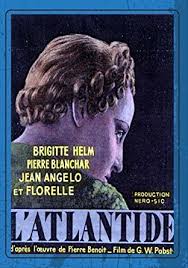
Captain St. Avit (John Stuart) and another member of the French Foreign Legion are listening to a scientist on the radio discussing his theory that the fabled city of Atlantis was not sunk in the Atlantic Ocean but instead lost in the sands of the Sahara Desert. Avit says that the scientist was right. He knows because, when he was a mere lieutenant, he and his friend Captain Morhange (Gustav Diessl) had been in the city of Atlantis two years ago. He also says that it was the place where he murdered his friend Morhange.
In flashback St. Avit tells his story. He and Morhange were on an assignment in the Sahara looking to gain the support of the Tuareg desert nomads. They had been traveling with a caravan for awhile but eventually separated from them and headed for a mountain range with their guide. They find one of the Tuareg but he is severely dehydrated. They give him water. The Tuareg becomes indispensable when their guide is killed by someone that the Tuareg calls enemies of his people.
Soon after that they are attacked and knocked unconscious. When St. Avit comes to he finds himself in the city of Atlantis. In Atlantis he meets the madcap Count Bielowsky (Gibb McLaughlin) and Ivar Torstensen (Mathias Wieman), a drug addled alcoholic. He keeps looking for Morhange but no one will tell him anything.
Atlantis is ruled by Antinea. It turns out that Antinea’s mother was a Parisian can-can dancer named Clementine (Florelle). She married a Tuareg Prince. Her father is actually Count Bielowsky. Torstensen is obsessed with the ruler of Atlantis. When she requests to see St. Avit, Torstensen, out of jealousy, tries to kill St. Avit. When that doesn’t work he commits suicide.
St. Avit asks Antinea where Morhange is. She won’t answer. She offers him his freedom if he can beat her at chess. He loses. St. Avit becomes obsessed with Antinea. She, on the other hand is interested in Morhange but he couldn’t care less. Antinea, not used to being ignored, pits St. Avit against Morhange. She seduces St. Avit and orders him to kill his best friend.
“The Mistress of Atlantis” AKA “Queen of Atlantis” AKA “L’Atlantide” was released in 1932. The movie is a German-French fantasy film and was directed by G.W. Pabst. It is based on the novel “L’Atlantide” by Pierre Benoit. It is a talkie remake of the silent film directed in 1921 by Jacques Feyder. The movie was made in three separate languages, French, English and German.
Back in the day, if you made a silent movie and wanted to release it in other countries all you had to do is change the intertitles to the language of whatever country you hoped it would be a hit in. When talkies came along that wasn’t so easy. There was dubbing but that was difficult since sound was still new. Quite often movies were filmed in different languages to take advantage of different markets. It’s the same thing that was done with “Dracula” 1931. The English version was filmed during the day and the Spanish version at night with different actors but the same sets.
“The Mistress of Atlantis” was one of those movies that was filmed in different languages. Some of the stars could speak more than one language like Brigitte Helm. She could speak French, English and her native German so she appeared in all three films. So did Mathias Wieman. Gustav Diessl was German and also spoke English.
As far as the movie is concerned I wasn’t all that thrilled with it. I found it kinda boring. Through most of the film I was confused. I don’t know why these two legionnaires were taken to Atlantis in the first place. Then St. Avit was just left there to roam around at will. It was a little less boring toward the end. The sandstorm is the only part I really enjoyed. Normally I like German Expressionism but this film didn’t really express anything. At least not to me.
The story itself has been adapted in some strange ways. The silent film was made in 1921 and this version in 1932. In 1949 an American sword and sandal version was made as “Siren of Atlantis” AKA “Atlantis, the Lost Continent”. In 1961 an Italian sword and sandal version was made titled “Hercules at the Conquest of Atlantis” AKA “Hercules and the Captive Women”. Then there was an Italian parody done 1950 called “Toto Sceicco” or “Toto the Sheik”. And in 1961 a European coproduction titled “Journey Beneath the Desert” was released. Lastly in 1992 a French-Italian release called “L’Atlantide”.
Brigitte Helm also starred as Maria and the robot in Fritz Lange’s “Metropolis” 1927.

